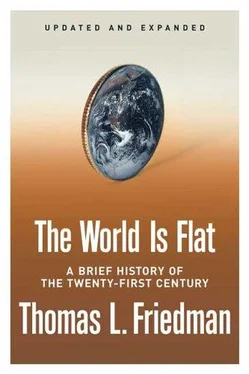Airline records show that she was seated next to an eighty-year-old grandmother-two people at opposites ends of life: one full of memories, one full of dreams.
What does this story say to me? It says this: When Candace Lee Williams boarded Flight 11 she could not have imagined how it would end. But in the wake of 9/11, none of us can now board an airplane without imagining how it could end-that what happened to Candace Lee Williams could also happen to us. We all are now so much more conscious that a person's life can be wiped out by the arbitrary will of a madman in a cave in Afghanistan. But the fact is, the chances of our plane being hijacked by terrorists today are still infinitesimal. We are more likely to be killed hitting a deer with our car or being struck by lightning. So even though we can now imagine what could happen when we get on an airplane, we have to get on the plane anyway. Because the alternative to not getting on that plane is putting ourselves in our own cave. Imagination can't just be about reruns. It also has to be about writing our own new script. From what I read about Candace Lee Williams, she was an optimist. I'd bet anything she'd still be getting on planes today if she had the chance. And so must we all.
America's role in the world, from its inception, has been to be the country that looks forward, not back. One of the most dangerous things that has happened to America since 9/11, under the Bush administration, is that we have gone from exporting hope to exporting fear. We have gone from trying to coax the best out of the world to snarling at it way too often. And when you export fear, you end up importing everyone else's fears. Yes, we need people who can imagine the worst, because the worst did happen on 9/11 and it could happen again. But, as I said, there is a fine line between precaution and paranoia, and at times we have crossed it. Europeans and others often love to make fun of American optimism and naivete-our crazy notion that every problem has a solution, that tomorrow can be better than yesterday, that the future can always bury the past. But I have always believed that deep down the rest of the world envies that American optimism and naivete, it needs it. It is one of the things that help keep the world spinning on its axis. If we go dark as a society, if we stop being the world's “dream factory,” we will make the world not only a darker place but also a poorer place.
Analysts have always tended to measure a society by classical economic and social statistics: its deficit-to-GDP ratio, or its unemployment rate, or the rate of literacy among its adult women. Such statistics are important and revealing. But there is another statistic, much harder to measure, that I think is even more important and revealing: Does your society have more memories than dreams or more dreams than memories?
By dreams I mean the positive, life-affirming variety. The business organization consultant Michael Hammer once remarked, “One thing that tells me a company is in trouble is when they tell me how good they were in the past. Same with countries. You don't want to forget your identity. I am glad you were great in the fourteenth century, but that was then and this is now. When memories exceed dreams, the end is near. The hallmark of a truly successful organization is the willingness to abandon what made it successful and start fresh.”
In societies that have more memories than dreams, too many people are spending too many days looking backward. They see dignity, affirmation, and self-worth not by mining the present but by chewing on the past. And even that is usually not a real past but an imagined and adorned past. Indeed, such societies focus all their imagination on making that imagined past even more beautiful than it ever was, and then they cling to it like a rosary or a strand of worry beads, rather than imagining a better future and acting on that. It is dangerous enough when other countries go down that route; it would be disastrous for America to lose its bearings and move in that direction. I think my friend David Rothkopf, the former Commerce Department official and now a fellow at the Carnegie Endowment for International Peace, said it best: “The answer for us lies not in what has changed, but in recognizing what has not changed. Because only through this recognition will we begin to focus on the truly critical issues-an effective multilateral response to weapons of mass destruction proliferation, the creation of real stakeholders in globalization among the world's poor, the need for reform in the Arab world and a style of U.S. leadership that seeks to build our base of support worldwide by getting more people to voluntarily sign onto our values. We need to remember that those values are the real foundation for our security and the real source of our strength. And we need to recognize that our enemies can never defeat us. Only we can defeat ourselves, by throwing out the rule book that has worked for us for a long, long time.”
I believe that history will make very clear that President Bush shamelessly exploited the emotions around 9/11 for political purposes. He used those 9/11 emotions to take a far-right Republican domestic agenda on taxes, the environment, and social issues from 9/10-an agenda for which he had no popular mandate-and drive it into a 9/12 world. In doing so, Mr.
Bush not only drove a wedge between Americans, and between Americans and the world, he drove a wedge between America and its own history and identity. His administration transformed the United States into “the United States of Fighting Terrorism.” This is the real reason, in my view, that so many people in the world dislike President Bush so intensely. They feel that he has taken away something very dear to them-an America that exports hope, not fear.
We need our president to restore September 11 to its rightful place on the calendar-as the day after September 10 and before September 12. We must never let it become a day that defines us. Because ultimately September 11 is about them-the bad guys-not about us.
We're about the Fourth of July. We're about 11/9.
Beyond trying to retain the best of our own imaginations, what else can we do as Americans and as a global society to try to nurture the same in others? One has to approach this question with great humility. What leads one person to the joy of destruction and what leads another to the joy of creation, what leads one to imagine 11/9 and another to imagine 9/11, is surely one of the great mysteries of contemporary life. Moreover, while most of us might have some clue about how to nurture a more positive imagination for our own kids, and maybe-maybe-for our fellow citizens, it is presumptuous to think that we can do it for others, particularly those of a different culture, speaking different languages, and living half a world away. Yet 9/11, the flattening of the world, and the continuing threat of world-disrupting terrorism suggest that not thinking about this is its own kind of dangerous naivete. So I insist on trying to do so, but I approach this issue with a keen awareness of the limits of what any outsider can know or do.
Generally speaking, imagination is the product of two shaping forces. One is the narratives that people are nurtured on-the stories and myths they and their religious and national leaders tell themselves-and how those narratives feed their imaginations one way or another. The other is the context in which people grow up, which has a huge impact on shaping how they see the world and others. Outsiders cannot get inside and adjust the Mexican or Arab or Chinese narrative any more than they can get inside the American one. Only they can reinterpret their narrative, make it more tolerant or forward looking, and adapt it to modernity. No one can do that for them or even with them. But one can think about how to collaborate with others to change their context-the context within which people grow up and live their daily lives-to help nurture more people with the imagination of 11/9 than 9/11. Let me offer a few examples.
Читать дальше












